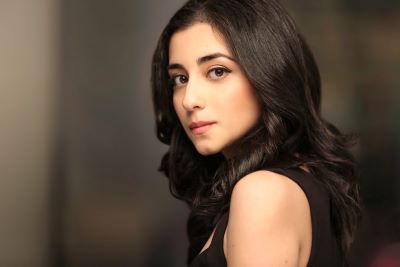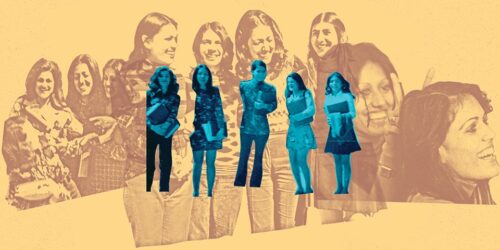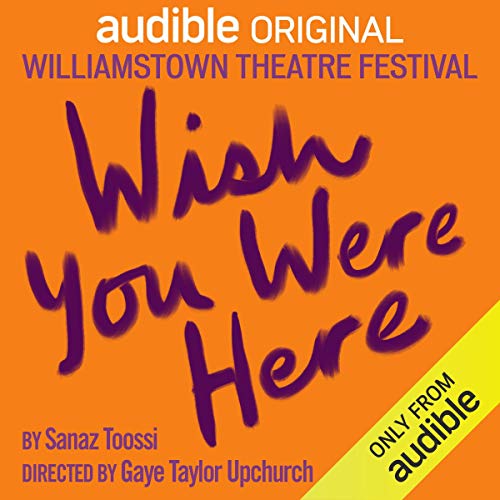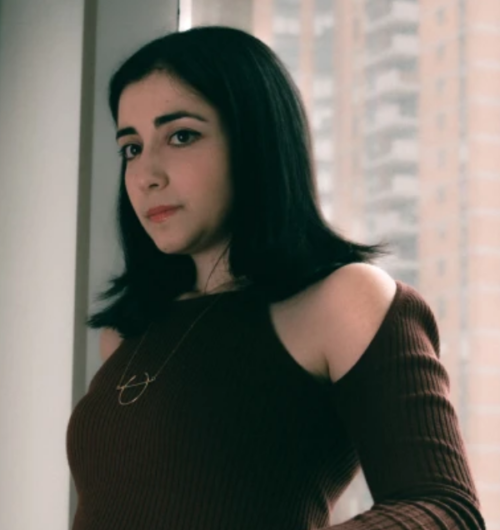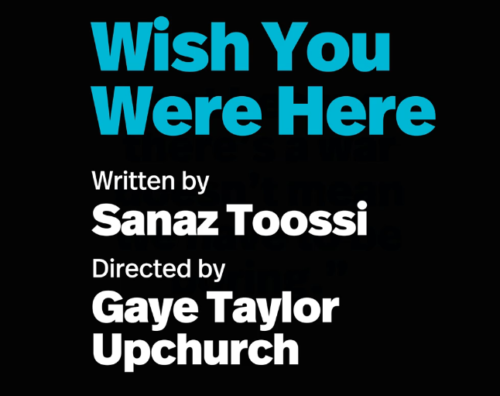YOU’LL WISH YOU WERE NIKKI
Wish You Were Here begins in 1978 when protests are breaking out across Iran, encroaching on a suburb where a tight-knit circle of girlfriends is getting ready for a wedding. As the revolution escalates, and the years pass, the five women try to hang onto a sense of normalcy and close ties, but ultimately are forced to join the wave of emigration — or face an equally uncertain future at home. By the final scene, the memory play has covered a little over a decade during the war, and the women have scattered, searching for a new place to call home. All but one.
In scene one, five best friends help a bride to prep for her wedding, putting on the final touches of make-up, the dress, and much playful teasing about the sexual anticipation of the honeymoon. (Jaw dropping in that I couldn’t imagine a group of guys entertaining each other in the same way: primping, massaging feet, licking face, and smelling privates.) Though the play is set in Karaj, Iran, this could be any close-knit group of women in the world, which is the beauty of what theater can do — bring awareness to a specific culture while providing universal themes to which we all can relate.
Recently, I had the opportunity to speak with actress Nikki Massoud who plays the role of Zari. Born in Montréal, Québec to parents who had recently emigrated from Iran, the family later immigrated to the U.S., where her father got a job at Georgetown University in Washington D.C. Currently a resident of NYC, Ms. Massoud has been cast in a huge variety of theater roles around the country: Bianca in Othello, Celia in As You Like It, Emmy in A Doll’s House Part II, Emily in Our Town, at such notable theaters as NYTW, The Old Globe, Berkeley Rep, Huntington Theatre Company, Portland Center Stage, South Coast Rep, Trinity Rep., and Williamstown Theatre Festival. And now, added to her impressive credits, Playwrights Horizons.
Gregory Fletcher / Stage and Cinema: Were you friends already with the other four actors in the cast? Marjan Neshat, Nazanin Nour, Artemis Pebdani, and Roxanna Hope Radja. I was completely convinced you were all the best of friends.
Nikki Masoud: I’m really glad to hear it. Well, as sad as it was, it didn’t hurt that the premiere was delayed two or two and half years, obviously due to COVID-19, which gave us the chance to get to know each other more than just in a normal rehearsal period. We were cast in 2020 and started an email chain, both work and pleasure, full of jokes and figuring out what’s the Farsi word for this and that. We also recorded this play for Audible, with a Zoom rehearsal process before we got to Playwrights’ Horizons. So, in a way, we’ve known each other for two years.
GF: Is Farsi your first language?
NM: Yes, the language I learned first, but I’m certainly more comfortable with English at this point. Because even with your parents in America after years, English creeps into the mix, and it’s hard to keep challenging yourself in that way. I have friends, including the playwright Sanaz Toossi, who get tutored in Farsi to improve their language skills and participate with weekly conversation classes, so that’s another way to keep it up. But when I was a child, my parents had just emigrated, so we spoke Farsi a lot. Especially my dad who wanted us to speak in Farsi so we could keep it up. I have a younger brother, and he was around less Farsi because he’s six/seven years younger than me. By that point, my parents’ English had improved, and he wasn’t exposed to it quite as much. But even so, there are a lot of words your parents aren’t teaching you. Especially, like in the play, the sex jokes — I wouldn’t know how to speak like that because my parents never would have taught me those words.
GF: Did your parents originally emigrate from Iran for similar reasons as the characters in the play?
NM: I think they emigrated, I guess you could say, for similar reasons; although, we don’t know exactly in the play why each woman wants to leave, except of course for Rana, who’s facing religious persecution because she’s Jewish. I think it’s safe to say my parents wanted to go to a place where it was safer. Safer for them. Both of them are feminists, and it was very important for them that their daughter have the same legal rights that their son would have, and that wasn’t the case, unfortunately. So, yes, the reasons are similar but again I think each woman in the play who emigrates has different reasons for doing so.
Artemis Pebdani, Nikki Massoud in Wish You Were Here
GF: You’ve been so fortunate to be cast in a big variety of roles, playing characters from all sorts of cultures. Do you think this play will be able to be cast at all levels of theatre, all over the world, or would such casting offend you? There’s an existing debate that Jewish actors are preferred for Jewish roles, and gay actors for gay roles, et cetera—should Middle Eastern actors only be allowed to play these wonderfully rich roles?
NM: Well, there are many actors in this country who are second-generation Iranian or second-generation MENA (Middle Eastern / North African) so I think you can certainly stick to casting that is inclusive, conscious, and appropriate to the play while having other actors play these roles. I know it was extremely important to our playwright, Sanaz, for the world premiere in New York that all the actors be authentically Iranian. Important because the play also includes a lot of Farsi. There are a lot of nuances of pronunciation and humor she wanted to make sure were there. I do think this is a play written for Iranian women, written for Middle Eastern women, it’s part of our cannon, and I think representation matters. There are young people all over America, Canada, and all over the world that I hope will get to do this play. These roles are written for them. This is their community being represented; this is their parents’ story. And I also enjoy the fact that our cast isn’t a bunch of twenty-year-olds. It’s really nice because it’s a memory play. You have women with a variety of ages in the play, playing these 20 to 30-year-old characters. I think that’s one of the beautiful things about theater. It’s not kitchen sink realism. There’s an element of magic. You could cast someone who’s appropriate for the role who isn’t necessarily the age of the character.
GF: Arnulfo Maldonado’s wonderful set design does exactly that. At first glance, it’s a realistic living room with a ceiling and glass doors that lead to a backyard. But as time moves forward, the living quarters belongs to different women and the multitude of doors go to different places.
NM: It was really funny when we first transitioned to the set. Which door is the bathroom, which is the closet, am I getting drinks from here? Just navigating which door was which — I love that there’s an element of magic, and it’s needed because these are brutal historical events, and an element of transcendence was needed to process what’s happening.
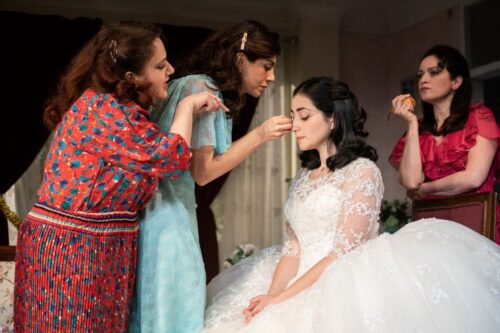 Artemis Pebdani, Marjan Neshat, Nikki Massoud, Roxanna Hope Radja
Artemis Pebdani, Marjan Neshat, Nikki Massoud, Roxanna Hope Radja
GF: Have you been to Iran? Any connections there?
NM: Last time I was there I was a teenager. We went to visit my grandmother. I haven’t been back since. She passed away, and all of my grandparents have passed at this point, so it became more difficult to visit. But I think it’s really exciting that we have two women cast from Los Angeles, where there’s a huge, vibrant Iranian community. It’s the largest community of Iranians outside of Iran. And our playwright is from southern California, too. So, I do have family there; I’ve visited many times, and it’s nice to be able to do that.
GF: Is there an active theater community in Iran right now? Do you think this play could be produced there someday?
NM: I don’t know of any plans for the play to be produced internationally or translated. Though a woman in the elevator talked to me about how well she thought the play would resonate in London. Which makes sense because it’s very much a play about emigration, so I do think it would resonate with people in the diaspora.
GF: What’s the New York City of Iran where theater would most likely be produced?
NM: Tehran is the capital and it’s an incredibly vibrant place. But I know much more about the wonderful films that come out of Iran, at the various film festivals and elsewhere. Theatre is so much more transient, which does make me a bit sad when I do a play, and it closes. Only the people who were there will ever know what it was like. I think we are recording this production for [the New York Public Library for the Performing Arts at] Lincoln Center, but it’s not the same. Film versions of plays are hard.
GF: I was hoping your performance on Homeland from Showtime had taken you back to the Middle East. That would’ve been interesting. Where were your scenes shot?
NM: In the Bronx.
GF: Oh. Sorry. What a disappointment.
NM: Not at all, it was my first job on a television show, which I think was the case for a lot of young MENA actors who worked on that show. My character lived in America and spoke with an American accent, so I didn’t have to stretch in any way to play that character. I had a good experience and got to work with Claire Danes, which I thought was pretty special. I think it’s safe to say we’ve come a long way since then with shows like Ramy and May Calamawy’s character on Moon Knight, the new Marvel show. There are big strides we’re making in representation. I haven’t re-watched Homeland since that time, but I imagine it would be a very different experience to watch it now than 11 years ago.
Marjan Neshat, Artemis Pebdani, Roxanna Hope Radja, Nikki Massoud
GF: Playwright Sanaz Toossi is quoted in the program that the play was inspired by the women she heard with obnoxious, cacophonous laughter. And that the decrescendo of that laughter is the central loss of the play. How does that resonate with you and your character?
NM: We talked about starting off the play at full blast, and slowly, over the course of the play, the volume gets turned down. And by the end of the play, it’s almost silent. That affected the mood, the dialogue, especially for the wedding scenes—spoiler alert. In the pre-wedding scenes, we’re celebrating; there’s a sense of wanting it to be a great day. Knowing that all these other things are happening in the world, which I think anyone can relate to in this moment in history, there are so many ominous, dark things happening in the world that prevent such laughter. But our characters in a room want to be happy — a wedding, a baby shower, an anniversary party, whatever it is, we want to make it happy. I think that is, unfortunately, very relatable. Everyone knows what it’s like to ignore CNN and the notifications on our phones. But I also think Sanaz really wanted to avoid a narrative of victimization. She wanted to avoid the stereotype that these women are exclusively sad. She really wanted to emphasize that they find joy and they are resilient under such circumstances. They have a lot of things in their life that are wonderful and worthwhile. Also, there’s something quite special about capturing this huge span of time in 95 minutes. It was important for her that it be compact.
Marjan Neshat (white dress), Roxanna Hope Radja (behind couch), Nikki Massoud, Artemis Pebdani
GF: Flashing forward eight years to your character’s move, do you think Zari will have any regrets? How do you imagine her future?
NM: I think in that last scene — not wanting to spoil it — I think Zari is a person who makes an effort to stay close to this friend she’s leaving, and obviously it’s not received well. But I think from her perspective, she tries her best to hold onto the friendship. If it doesn’t work, it’s not her fault. Better to have loved than to have lost. But moving forward, she loves her husband; she really wants kids—so what I hope for her is that she comes to America and gets to have a family and continues to be happy in her marriage. There’s at least one other friend she’ll probably stay in touch with from that group. I think there are other characters in the play with bigger regrets. At least, Zari is the one who’s willing to make an idiot of herself to stay open to love and connection. And I don’t think people usually regret that in the long run.
Marjan Neshat, Roxanna Hope Radja (in white dress), NazaninNour (behind her), Artemis Pebdani, Nikki Massoud
GF: As the play proceeds, and women leave, it’s hard to keep in touch. Long distance telephone calls were more expensive back then. I’m guessing it would be easier to keep in touch today with WhatsApp and social media.
NM: Even with cell phones and WhatsApp, people have to make the effort. That’s the other thing about this play — I’ve encountered other women, especially older women, who relate to the play because they’ve lost touch with their friends from childhood — due to having children and obligations or moving somewhere else. It’s work to maintain any relationship long distance. And when you add on a time difference and the expense, there are a lot of barriers.
GF: When your character says goodbye late in the play, that multilayer of happy/sadness you play is so lovely, also present in many of the women’s performances. Instead of a sentimental, goodbye, I was happy for you, but felt my heart breaking at the same time. The scene was so touching. And despite that the play is about a specific group of women in a specific time and place, it felt relatable to me. I connected to the humor, the teasing, the striving for normalcy, and ultimately realizing some friends are not meant for life but only for a chapter. I left the theater thinking of past friends I wish I could find on Facebook and reach out to them with the message: wish you were here.
production photos by Joan Marcus
Nikki Massoud headshot by Dirty Sugar Photography
Wish You Were Here
Playwrights Horizons, 416 West 42nd St
ends on May 29, 2022 EXTENDED to June 5, 2022
for tickets visit Playwrights Horizons
for more info, visit Nikki Massoud
